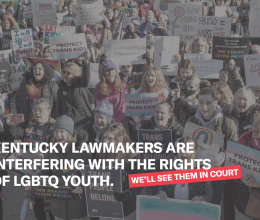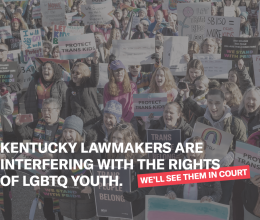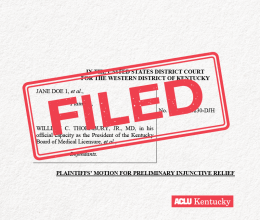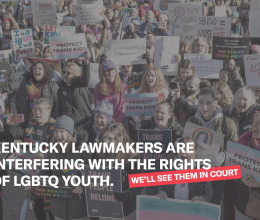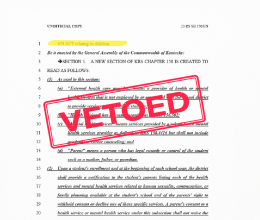
The Kentucky General Assembly recently passed a law that cancels emergency regulation 702 KAR 1:195E, which required all individuals, including students, school employees, contractors, and visitors to wear a mask while inside any school facility, leaving it up to the individual school districts to set their own rules (or not) regarding masking in their schools. To date, all but six school districts in Kentucky have decided to require universal masking.
The remaining school districts, by either refusing to require universal masking or making masks optional, are denying children with disabilities their rights under federal disability law, to access services at their public school through reasonable accommodation (i.e., requiring all individuals in the building to wear masks), and needlessly exposing those children to COVID-19.
Like the pandemic, the issue of masking has become highly politicized, but this is not about personal politics. This is about protecting children whose disability, including underlying health conditions, makes them particularly vulnerable to severe illness from COVID-19 and protecting their right to an equal education, which is required under federal law. Requiring masks to protect students with disabilities is no different than banning peanut butter for a student who has an allergy or installing a ramp or elevator for a student who needs mobility assistance.
Title II of the Americans with Disabilities Act (ADA) and Section 504 of the Rehabilitation Act provide broad protections for qualified individuals with disabilities. These laws prohibit the outright exclusion, denial of services, and segregation of individuals with disabilities by public entities, while imposing affirmative obligations on these entities, including public schools. These obligations include proactively providing reasonable modifications or accommodations for individuals covered by the law, to ensure people with disabilities have an equal opportunity to participate in public programs, services, and activities in the most “integrated” environment possible. Not only would forcing these students to stay home violate these laws, putting these students in a different classroom or merely offering a remote learning option also fails to provide the most “integrated” setting to meet the needs of qualified individuals. Federal courts around the country are agreeing. Courts in Iowa and Tennessee recently held that policies in those states blocking universal masking requirements violated students’ rights under the Americans with Disabilities Act.
Without requiring universal masking in public schools, parents of children with underlying medical conditions are left with the difficult decision of jeopardizing their children’s health and safety by sending them to school or keeping them home and while safe, depriving them of the benefits of an education to which every child is entitled. Universal masking policies will not infringe on civil liberties. Rather they are necessary to preserve the civil rights of children with disabilities.
Schools should always be protecting the most vulnerable among us, and in fact, federal law requires them to provide those protections.
When lawmakers ended statewide masking requirements, we wrote to all districts expressing our concerns and reminding them of their obligation to make reasonable accommodations to ensure students with disabilities can safely access an equal public education. Read more about it and see our letter here.

